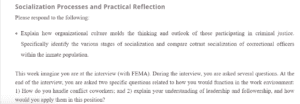Socialization Processes
Explain how organizational culture molds the thinking and outlook of those participating in criminal justice. Specifically, identify the various stages of socialization and compare the contrast socialization of correctional officers within the inmate population.
Are you interested in obtaining an original copy of “Socialization Processes”? Get in touch with us at eminencepapers.com
An organization’s culture will direct its members’ behaviors and thoughts in CJS. Corrections and police academies are usually molded on a partisan mindset, so individuals in this field will be instilled with the dominant and superior thought process (Bales & Parsons, 2014). Anticipatory, informal, and formal are the stages of the socialization processes. Anticipatory socialization takes place before one starts working; an anticipation one gets for any demands with their future placement. Formal takes place during training (police academy), and informal socialization involves the way individuals form their role in the occupation while interacting with others (Bales & Parsons, 2014). Officers yet to enter the correction field may fail to understand what pertains to that field. They presume it is a hostile environment that initially makes them aloof. They realize later that offenders are not as violent as they assumed earlier. With time, the informal stage of socialization ensues.
At the end of the interview, you are asked two specific questions about how you would function in the work environment: 1) How do you handle conflict with coworkers, and 2) explain your understanding of leadership and followership and how would you apply them in this position?
The first step to solving conflicts with coworkers is to converse with the opposing parties to reach a mutual agreement, and if it does not work, then the matter can be forwarded to the following chain of command. Leaders must motivate employees to diligently and carefully do their daily duties. Essentially, one should follow or lead by example by acting professionally.
Other Related Post: Adaptive Structures
References
Bales, R. F., & Parsons, T. (2014). Family: Socialization and interaction process. Routledge.
ORDER A PLAGIARISM-FREE PAPER HERE
We’ll write everything from scratch
Question
Socialization Processes and Practical Reflection
Please respond to the following:

Socialization Processes
- Explain how organizational culture molds the thinking and outlook of those participating in criminal justice. Specifically, identify the various stages of socialization and compare the contrast socialization of correctional officers within the inmate population.
This week imagine you are at the interview (with FEMA). During the interview, you are asked several questions. At the end of the interview, you are asked two specific questions about how you would function in the work environment: 1) How do you handle conflict with coworkers, and 2) explain your understanding of leadership and followership and how would you apply them in this position?


